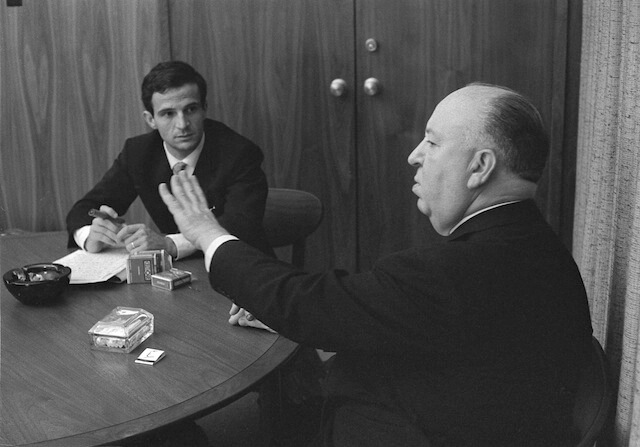‘Hitchcock/Truffaut’ No single filmmaker has been as analyzed and deconstructed and debated and ripped off as Alfred Hitchcock. The joys of watching “Hitchcock/Truffaut,” Kent Jones’ new doc, doesn’t come from any particularly new things it brings to the table, which is very little. It even goes back to one of the all-time classic film books: Francois Truffaut’s 1966 career-spanning chat with the Master of Suspense, from which the doc takes its name and the whisper of a structure. It looks at his work mostly from formal and thematic concerns, and the pleasures are similar to revisiting the old film canon — not to mention from watching a clips-and-talking-heads doc made by someone with an intimate and insightful knowledge of a boundlessly rich subject. Jones, also a critic and the current head of the New York Film Festival, gets a bit of history out of the way first, rushing through Hitchcock’s life, but with a focus on his passion for images. (He entered the film business as a title card designer.) Then he sets up what will be the doc’s centerpiece: Truffaut’s interviews, from 1962, with one of his favorite filmmakers. Jones portrays it as one would the setup to a heist film: back then Hitchcock was taken seriously by almost no one but young French film critics. Truffaut wanted to change that, and he knew he could do it by getting him to talk in a way that deviated from his mordant public persona. RELATED: Review: “Chi-Raq” isclassic Spike Lee: angry, wild and genuinely important No footage exists of the two filmmakers’ tete-a-tetes, though recently released audio (plus a smattering of stills) finds its way into Jones’ film. (You can hear what sounds like Truffaut chuckling when Hitch busts out his infamous “actors are cattle” line.) The sessions are a springboard anyway, usually to other filmmakers talking about both Hitchcock and Truffaut’s work. There’s the occasional token hyperbole, but people like David Fincher, Wes Anderson, Martin Scorsese and Olivier Assayas tend to go next level, digging deep into how his films work. Most of what they say has been said elsewhere, often thousands of times, but they’re conversations worth revisiting. And everyone’s both reverent and critical of “Vertigo,” the current Greatest Film Ever Made. Scorsese admits the plot makes little logical sense, while James Gray astutely describes the film’s subtext as “bubbling up to the point where it’s almost text.” You have to go back to the man himself to get the memorable description of the film’s final reveal of Kim Novak 2.0 as recreating the feeling of “getting an erection.” Even the film’s sexual politics get worked through, saying a film about a man abusing a woman was empathetic to both sides. This is all not just said but shown. Often times in movies about movies, clips tend to be decorative. Here they’re illustrative. Jones knows exactly which clips from which films to show and when. And he doesn’t only stick to Hitchcock; he’ll cut in relevant bits from Truffauts, at one point to illustrate how they may be wildly different — Hitchcock controlled; Truffaut loose — but how Truffaut took much of his editing and sense of forward movement from his interviewee. Jones structures the doc around ideas, at one point moving from an exploration of Hitch’s yen for god’s-eye-view shots to a discussion of how he wrestles his very Catholic sense of guilt. There’s infinitely more to talk about than in “Hitchcock/Truffaut”’s slim 79 minutes, but it’s no mere primer, and it makes you want to run to the bookshelf and crack open Robin Wood’s “Hitchcock’s Films Revisited,” and much else besides.
Director: Kent Jones
Genre: Documentary
Rating: NR
3 (out of 5) Globes
‘Hitchcock/Truffaut’ is an atypically insightful movie about movies

Cohen Media Group
Follow Matt Prigge on Twitter @mattprigge














